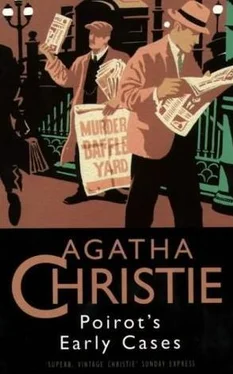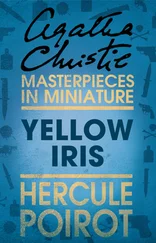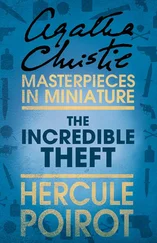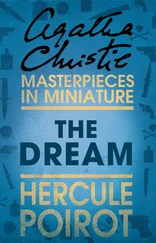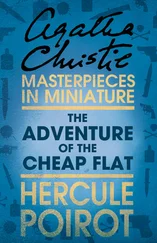Agatha Christie - Poirot's Early Cases
Здесь есть возможность читать онлайн «Agatha Christie - Poirot's Early Cases» весь текст электронной книги совершенно бесплатно (целиком полную версию без сокращений). В некоторых случаях можно слушать аудио, скачать через торрент в формате fb2 и присутствует краткое содержание. Год выпуска: 1996, ISBN: 1996, Издательство: HarperCollins Publishers Ltd, Жанр: Классический детектив, на английском языке. Описание произведения, (предисловие) а так же отзывы посетителей доступны на портале библиотеки ЛибКат.
- Название:Poirot's Early Cases
- Автор:
- Издательство:HarperCollins Publishers Ltd
- Жанр:
- Год:1996
- ISBN:ISBN-13: 978-0006167129
- Рейтинг книги:4 / 5. Голосов: 2
-
Избранное:Добавить в избранное
- Отзывы:
-
Ваша оценка:
- 80
- 1
- 2
- 3
- 4
- 5
Poirot's Early Cases: краткое содержание, описание и аннотация
Предлагаем к чтению аннотацию, описание, краткое содержание или предисловие (зависит от того, что написал сам автор книги «Poirot's Early Cases»). Если вы не нашли необходимую информацию о книге — напишите в комментариях, мы постараемся отыскать её.
Poirot's Early Cases — читать онлайн бесплатно полную книгу (весь текст) целиком
Ниже представлен текст книги, разбитый по страницам. Система сохранения места последней прочитанной страницы, позволяет с удобством читать онлайн бесплатно книгу «Poirot's Early Cases», без необходимости каждый раз заново искать на чём Вы остановились. Поставьте закладку, и сможете в любой момент перейти на страницу, на которой закончили чтение.
Интервал:
Закладка:
The letter to Miss Amelia Barrowby was duly written and sen but no reply was forthcoming. Perhaps, thought Hercule Poin the old lady had unravelled her mystery herself. Yet he felt a sha of surprise that in that case she should not have written a courteouo word to say that his services were no longer required.
It was five days later when Miss Lemon, after receiving her morning's instructions, said, 'That Miss Barrowby we wrote to no wonder there's been no answer. She's dead.' Hercule Poirot said very softly, 'Ah - dead.' It sounded not so much like a question as an answer.
Opening her handbag, Miss Lemon produced a newspaper cutting. 'I saw it in the tube and tore it out.' Just registering in his mind approval of the fact that, though Miss Lemon used the word 'tore', she had neatly cut the entry out with scissors, Poirot read the announcement taken from the Births, Deaths and Marriages in the Morning Post: 'On March 26th suddenly- at Rosebank, Charman's Green, Amelia Jane Barrowby, in her seventy-third year. No flowers, by request.' Poirot read it over. He murmured under his breath, 'Suddenly'.
Then he said briskly, 'If you will be so obliging as to take a letter, Miss Lemon?' The pencil hovered. Miss Lemon, her mind dwelling on the intricacies of the filing system, took down in rapid and correct shorthand:
Dear Miss Barrowby, I have received no reply from you, but as I shall be in the neighbourhood of Charman's Green on Friday, I will call upon you on that day and discuss more fully the matter mentioned to me in your letter.
Yours, etc.
'Type this letter, please; and if it is posted at once, it should get to Charman's Green tonight.' On the following morning a letter in a black-edged envelope arrived by the second post:
Dear Sir, In reply to your letter my aunt, Miss Barrowby, passed away on the twenty-sixth, so the matter you speak of is no longer of importance.
Yours truly, MARY DELAFONTAINR
Poirot smiled to himself. 'No longer of importance… Ah that is what we shall see. En avant - to Charman's Green.' Rosebank was a house that seemed likely to live up to its name, which is more than can be said for most houses of its class and character.
Hercule Poirot paused as he walked up the path to the front door and looked approvingly at the neatly planned beds on either side of him. Rose trees that promised a good harvest later in the year, and at present daffodils, early tulips, blue hyacinths - the last bed was partly edged with shells.
Poirot murmured to himself, 'How does it go, the English rhyme the children sing?
Mistress Mary, quite contrary, How does your garden grow?
With cockle-shells, and silver bells, And pretty maids all in a row.
'Not a row, perhaps,' he considered, 'but here is at least one pretty maid to make the little rhyme come right.' The front door had opened and a neat little maid in cap and apron was looking somewhat dubiously at the spectacle of a heavily moustached foreign gentleman talking aloud to himself in the front garden. She was, as Poirot had noted, a very pretty little maid, with round blue eyes and rosy cheeks.
Poirot raised his hat with courtesy and addressed her: 'Pardon, but does a Miss Amelia Barrowby live here?' The little maid gasped and her eyes grew rounder. 'Oh, sir, didn't you know? She's dead. Ever so sudden it was. Tuesday night.' She hesitated, divided between two strong instincts: the first, distrust of a foreigner; the second, the pleasurable enjoyment of her class in dwelling on the subject of illness and death.
'You amaze me,' said Hercule Poirot, not very truthfully. 'I had an appointment with the lady for today. However, I can perhaps see the other lady who lives here.' The little maid seemed slightly doubtful. 'The mistress? Well, you could see her, perhaps, but I don't know whether she'll b eeing anyone or not.'
'She will see me,' said Poirot, and handed her a card.
The authority of his tone had its effect. The rosy-cheeked maid fell back and ushered Poirot into a sitting-room on the right of the hall. Then, card in hand, she departed to summon her mistress.
Hercule Poirot looked round him. The room was a perfectly conventional, drawing-room - oatmeal-coloured paper with a frieze round the top, indeterminate cretonnes, rose-coloured cushions and curtains, a good many china knick-knacks and ornaments. There was nothing in the room that stood out, that announced a definite personality.
Suddenly Poirot, who was very sensitive, felt eyes watching him. He wheeled round. A girl was standing in the entrance of the french window - a small, sallow girl, with very black hair and suspicious eyes.
She came in, and as Poirot made a little bow she burst out abruptly, 'Why have you come?'
Poirot did not reply. He merely raised his eyebrows.
'You are not a lawyer - no?' Her English was good, but not for a minute would anyone have taken her to be English.
'Why should I be a lawyer, mademoiselle?'
The girl stared at him sul.nly. 'I thought you might be. I thought you had come perha?;o say that she did not know what she was doing. I have heard of such things - the not due influence; that is what they call it, no? But that is not right. She wanted me to have the money, and I shall have it. If it is needful I shall have a lawyer of my own. The money is mine. She wrote it down so, and so it shall be.' She looked ugly, her chin thrust out, her eyes gleaming.
The door opened and a tail woman entered and said, 'Katrina'.
The girl shrank, flushed, muttered something and went out through the window.
Poirot turned to face the newcomer who had so effectually dealt with the situation by uttering a single word. There had been authority in her voice, and contempt and a shade of well-bred irony. He realized at once that this was the owner of the house, Mary Delafontaine.
'M. Poirot? I wrote to you. You cannot have received my letter.'
'Alas, I have been away from London.' 'Oh, I see; that explains it. I must introduce myself. My name is Delafontaine. This is my husband. Miss Barrowby was my aunt.' Mr Delafontaine had entered so quietly that his arrival had passed unnoticed. He was a tall man with grizzled hair and an indeterminate manner. He had a nervous way of fingering his chin. He looked often towards his wife, and it was plain that he expected her to take the lead in any conversation.
'I much regret that I intrude in the midst of your bereavement,' said Hercule Poirot.
'I quite realize that it is not your fault,' said Mrs Delafontaine.
'My aunt died or Tuesday evening. It was quite unexpected.' 'Most unexpected,' said Mr Delafontaine. 'Great blow.' His eyes watched the window where the foreign girl had disappeared.
'I apologize,' said Hercule Poirot. 'And I withdraw.' He moved a step towards the door.
'Half a sec,' said Mr Delafontaine. 'You - er - had an appointment with Aunt Amelia, you say?' 'Parfa(tement.' 'Perhaps you will tell us about it,' said his wife. 'If there i. anything we can do - ' 'It was of a private nature,' said Poirot. 'I am a detective,' he added simply.
Mr Delafontaine knocked over a little china figure he was handling. His wife looked puzzled.
'A detective? And you had an appointment with Auntie? But how extraordinary? She stared at him. 'Can't you tell us a little more, M. Poirot? It - it seems quite fantastic.' Poirot was silent for a moment. He chose his words with care.
'It is difficult for…me, madame, to know what to do.' 'Look here,' said Mr Delafontaine. '8he didn't mention Russians, did she?' 'Russians?' 'Yes, you know - Bolshies, Reds, all that sort of thing.' 'Don't be absurd, Henry,' said his wife.
Mr Delafontaine collapsed. 'Sorry - sorry - I just wondered.' Mary Delafontaine looked frankly at Poirot. Her eyes were very blue - the colour of forget-me-nots. 'If you can tell us anything, M. Poirot, I should be glad if you would do so. I can assure you that I have a - a reason for asking.'
Читать дальшеИнтервал:
Закладка:
Похожие книги на «Poirot's Early Cases»
Представляем Вашему вниманию похожие книги на «Poirot's Early Cases» списком для выбора. Мы отобрали схожую по названию и смыслу литературу в надежде предоставить читателям больше вариантов отыскать новые, интересные, ещё непрочитанные произведения.
Обсуждение, отзывы о книге «Poirot's Early Cases» и просто собственные мнения читателей. Оставьте ваши комментарии, напишите, что Вы думаете о произведении, его смысле или главных героях. Укажите что конкретно понравилось, а что нет, и почему Вы так считаете.
